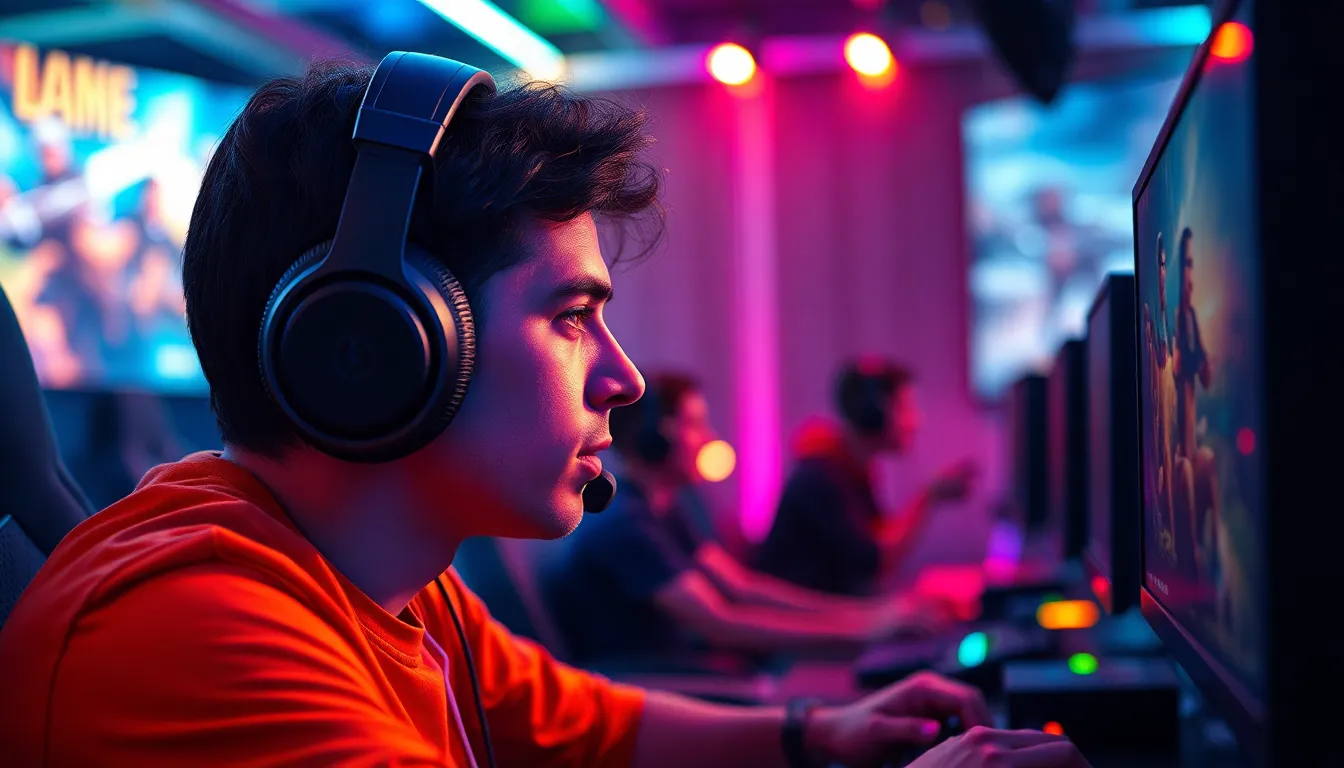In the vast universe of gaming, soundtracks often take a backseat to graphics and gameplay. But let’s face it—what’s a heroic quest without a heart-pounding score or a cozy village without a whimsical tune? PC game soundtracks are the unsung heroes that elevate the gaming experience from mundane to unforgettable. They’re the musical magic that can turn a simple button-mashing session into an epic saga worthy of a Hollywood blockbuster.
Imagine battling through a post-apocalyptic wasteland with a soundtrack that makes you feel like a rock star. Or, picture yourself solving puzzles in a serene forest while a gentle melody tugs at your heartstrings. These soundtracks don’t just accompany the gameplay; they enhance emotions, create memories, and sometimes even make players laugh—or cry. So, grab your headphones and get ready to dive into the world of PC game soundtracks that’ll make your gaming sessions legendary.
Table of Contents
ToggleOverview of PC Game Soundtracks
PC game soundtracks play a vital role in enhancing the overall gameplay experience. Composed carefully, these soundtracks create immersive worlds that captivate players and deepen emotional engagement. Various genres exist, ranging from orchestral and electronic to ambient and rock. Each genre can evoke distinct feelings, ensuring that the music complements the game’s theme and narrative.
Iconic soundtracks often feature memorable motifs and themes that resonate long after gameplay ends. For instance, titles like The Elder Scrolls V: Skyrim and Final Fantasy VII showcase compositions that players can identify instantly. Such familiarity strengthens connections between players and their favorite games, further cementing those experiences in their memory.
Additionally, soundtracks influence gameplay mechanics. In action games, fast-paced music can heighten adrenaline, while serene melodies in exploration games can foster relaxation. Music cues also inform players of significant in-game events, enhancing their awareness of surroundings.
Furthermore, the rise of streaming platforms and digital downloads has increased accessibility to game soundtracks. Players now enjoy the option to experience their favorite scores outside of the gaming environment. Popular platforms for discovering these tracks include Spotify and YouTube, where gamers can share playlists and celebrate their beloved tunes.
In recent years, live orchestral performances of game soundtracks have grown in popularity. Concerts like Video Games Live and Distant Worlds: Music from Final Fantasy attract audiences eager to experience music performed by full orchestras. Such events highlight the cultural significance of video game music and its artistic value.
Overall, PC game soundtracks contribute significantly to gaming experiences. They offer emotional depth, enhance gameplay dynamics, and foster lasting connections between players and the games they love.
Importance of Music in Gaming

Music in gaming offers more than just background noise. It shapes experiences, facilitates emotional journeys, and enhances the overall atmosphere.
Emotional Engagement
Soundtracks evoke emotions, thus creating stronger connections between players and the game. Orchestral scores imbue epic moments with grandeur, while ambient sounds provide a sense of tranquility. Iconic melodies stick with players long after they finish their gaming sessions. Memorable themes can even trigger nostalgia, reminding players of their journey through various worlds. Games like The Legend of Zelda and Journey use music to deepen player immersion, guiding reactions during pivotal moments. Engaging soundtracks elicit reactions, ensuring that players feel the weight of their decisions and the significance of their adventures.
Enhancing Gameplay Experience
Gameplay experience improves significantly with a well-crafted soundtrack. Fast-paced music heightens excitement during intense battles, making victories feel even more exhilarating. Conversely, calming tunes support exploration, allowing players to lose themselves in vast game worlds. Developers strategically implement sound effects and scores to underscore key events, creating a more cohesive experience. Games like Dark Souls utilize shifts in music to signal danger or triumph, elevating tension. The dynamic relationship between sound and gameplay enriches interactions, making every moment feel purposeful and engaging. Overall, music transforms gameplay, enhancing enjoyment and immersion.
Notable PC Game Soundtracks
Soundtracks play an essential role in shaping memorable gaming experiences. Several titles stand out due to their exceptional musical compositions.
Classic Titles
Classic titles feature iconic soundtracks that resonate with players. The Elder Scrolls V: Skyrim uses sweeping orchestral themes to immerse players in its expansive world. Final Fantasy VII offers memorable motifs that evoke deep emotional responses. Similarly, DOOM delivers intense, fast-paced tracks that heighten the adrenaline-fueled action. Games like Myst also incorporate ambient soundscapes, creating an atmospheric experience that captivates players. These soundtracks defined a generation and continue to influence modern game design.
Modern Masterpieces
Modern masterpieces demonstrate the evolution of video game music. The Last of Us includes haunting melodies that underscore its emotional narrative. Celeste features chiptune-inspired tracks that perfectly match its challenging platforming gameplay. Hades combines energetic scores with Greek mythology, creating a compelling audio experience. Additionally, Ghost of Tsushima captivates with its traditional Japanese instruments, enhancing the game’s visual storytelling. These soundtracks exemplify how music in contemporary gaming enhances immersion and emotional engagement.
Composers Behind the Magic
Compelling music transforms gaming experiences, and composers play a vital role in crafting these soundscapes.
Influential Figures
Notable names dominate the landscape of PC game soundtracks. Nobuo Uematsu created memorable pieces for the Final Fantasy series, integrating orchestral elements with rich storytelling. Martin O’Donnell’s work on the Halo franchise introduced iconic themes that defined a generation. Jeremy Soule is celebrated for his orchestral scores in The Elder Scrolls series, enhancing the game world with sweeping melodies. Yasunori Mitsuda, known for Chrono Trigger, blended various musical styles to create emotional depth. Composers like Austin Wintory for Journey utilize unique instrumentation to deepen player immersion. Their contributions elevate soundtracks to an art form within the gaming industry.
Emerging Talents
New voices are making significant strides in the world of game soundtracks. Gareth Coker’s work on Ori and the Blind Forest showcases how emotional storytelling can blend seamlessly with music. Disasterpeace, known for his score in Fez, demonstrates the power of chiptune in creating nostalgic experiences. Laura Shigihara’s music in To the Moon emphasizes lyrical storytelling, engaging players on an emotional level. Yasunori Mitsuda’s disciples, including those from dynamic indie titles, push boundaries with innovative sounds. Additionally, composers like Lena Raine, whose work in Celeste received critical acclaim, highlight the evolving landscape of game music. Together, these emerging talents are redefining what soundtracks can achieve in gaming.
Trends in PC Game Soundtracks
Evolving styles in PC game soundtracks reflect changing player preferences. Contemporary soundtracks increasingly blend orchestral arrangements with electronic elements, creating hybrid genres that captivate listeners. Integrating unique soundscapes enhances emotional engagement during gameplay.
Notable examples include the haunting score of The Last of Us and the energetic tracks from Hades, both showcasing innovative approaches to music composition. As developers explore diverse musical genres, soundtracks evoke specific moods that resonate with players. Exploring various styles allows composers to expand their creative horizons while maintaining strong emotional connections.
Emerging trends also emphasize interactive music systems. Many games now feature adaptive soundtracks that shift in response to player actions, enhancing immersion. Titles like Ghost of Tsushima demonstrate the power of real-time music adjustments that correspond to pivotal moments in gameplay. Tailoring soundtracks to players’ experiences creates a deeper bond between them and the game.
Another trend is the increasing accessibility of soundtracks. Streaming platforms provide players easy access to their favorite scores, deepening their appreciation for the music outside the gaming environment. Prominent games regularly release their soundtracks on services like Spotify, allowing fans to enjoy the melodies whenever they desire.
Live performances of game music are gaining popularity, affirming the artistic value of soundtracks. Concerts such as Video Games Live highlight beloved scores, creating a unique experience for fans and composers alike. Celebrating music from iconic games reinforces its cultural significance in the broader entertainment landscape.
Overall, the evolving landscape of PC game soundtracks showcases innovation and emotional depth, significantly enhancing the gaming experience for players.
PC game soundtracks are more than just background music; they’re integral to the gaming experience. These compositions evoke emotions and create lasting memories that resonate with players long after they’ve put down the controller.
As the industry evolves, soundtracks continue to push boundaries, blending genres and incorporating innovative techniques that enhance immersion. The accessibility of these scores through streaming platforms allows fans to revisit their favorite melodies anytime.
With the rise of live performances, the appreciation for video game music is only growing. Whether through orchestral arrangements or interactive soundscapes, the artistry behind these soundtracks enriches gameplay, making every moment unforgettable.




